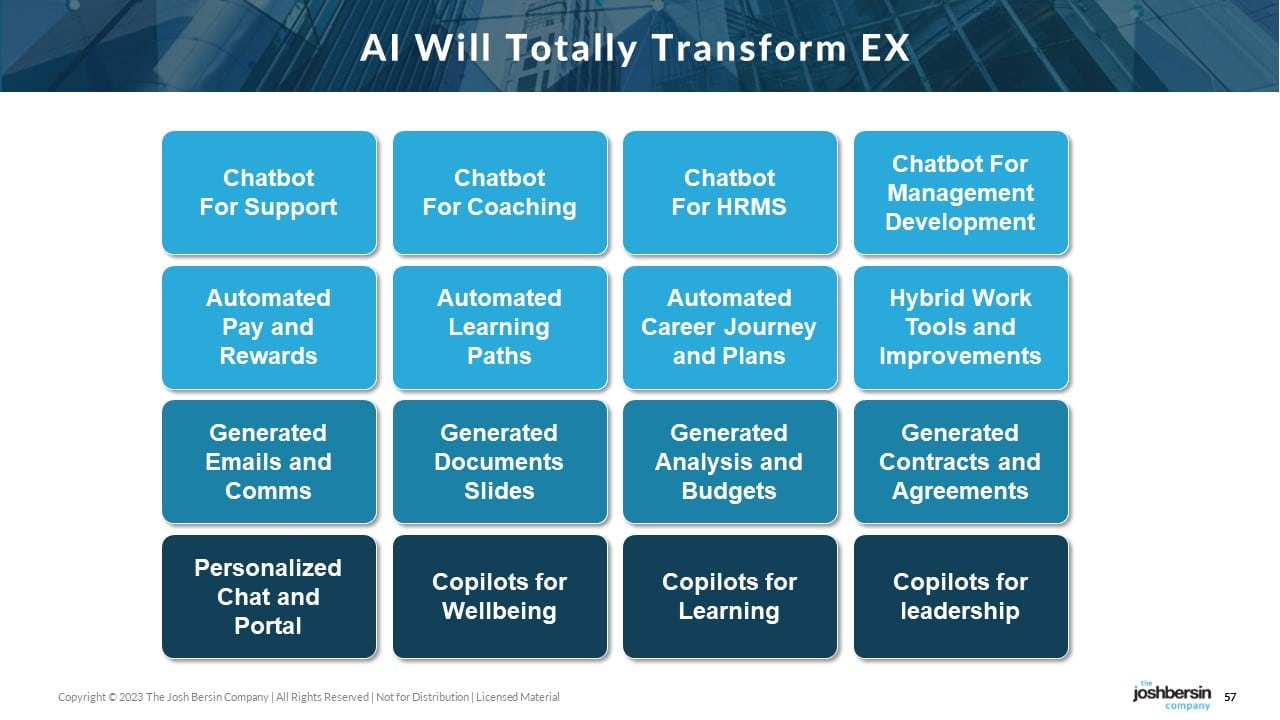Artificial intelligence technology has been in the making for decades, and, last year, with the dawn of generative AI, it finally took off at scale. Now, AI is about to “revolutionize” HR in the coming year, predicted industry analyst Josh Bersin this week.
Speaking at the HR Tech Conference’s opening keynote Wednesday morning in Las Vegas, Bersin noted that, apart from the technological advancements that enabled the proliferation of AI, a perfect storm of factors opened HR’s door to the tech.
Ongoing low unemployment, economic uncertainty, increasing labor activity and soaring employee stress have all had CEOs “waking up in the morning thinking about people,” Bersin says, as, for the first time, they prioritize their employees’ interests over those of customers and stakeholders. Meanwhile, as fertility rates continue to fall, leadership faces pressure to do more with less.
See also: The top trailblazers in AI for HR, according to expert Josh Bersin

“We have to learn how to run a company with fewer people, generating higher levels of productivity, having more flexibility in jobs, having more empowerment, more skills,” Bersin says. “Every employee—including in HR—is going to need to be superpowered.”
And that’s where AI will come in.
Where AI will ‘dominate’
While the emergence of mobile and the cloud marked turning points in HR tech development, AI will be even more disruptive.
In the last few years, AI went from entering the HR tech stack to permeating it—and, in 2024, Bersin says, it will “dominate” the stack.
“Now, we’re affecting the actual application use case of everything you do in HR,” he says. “Every screen, every panel, every interaction you have will be informed and improved and made more intelligent by AI.”
Bersin identified a number of HR areas that will be most impacted by AI in the coming months:
Skills identification
Bersin says that the heightened focus on skills in recent years is owed to the increasing speed with which employees are looking to move between jobs and roles. And that provides an opening for AI.
“We need to move people faster, so we need to know what their skills are,” he says. However, HR leaders need to be cautious when purchasing AI-powered tech in this segment, as he cautions that “very few” vendors have been able to build AI-fueled global skills databases that can effectively drive skills matching, given the unique skills challenges from company to company.
“This is a big hairy problem,” Bersin says.
Employee experience
As technology floods into employees’ everyday work, AI can make that experience more seamless—from chatbots to hybrid work tools to email auto-generation.
The success or failure of every HR technology product today, Bersin emphasizes, depends entirely on how easy it is for employees to use, how seamlessly they can incorporate it into their flow of work and how effectively it helps them get their jobs done.

Recruiting
The most sophisticated applications of AI for HR are seen in the recruiting domain—because there is so much opportunity for it, Bersin says.
For instance, as recruiters evaluate candidates, they must answer layers of questions: Is this person a fit for our organization? Will they pass the interview? Will they fit the role? Do they have the technical skills we need?
Right there, Bersin says, are four different opportunities for AI models to run behind the scenes and deliver right-fit candidates to recruiters.
Bersin emphasizes AI will not—and should not—replace human recruiters, whom he says will transform into “talent advisors.”
“The role of the recruiter will be upskilled significantly into that superhuman type, as some of these more transactional parts of recruiting are automated,” he says.
Talent marketplaces
AI is increasingly finding a home in talent marketplaces, which Bersin advises should be viewed not simply as HR tools but as a means of strategically changing an organization’s operating model. A top-down approach to internal mobility is no longer feasible, as leadership should instead empower their workforce, using AI, to find their next roles.
“That can generate a much higher value for your company than if you wait for the management team to make decisions,” he says.
See also: Looking for new technology at HR Tech? 20 questions to ask
Learning
The learning and development space needed a “shot in the arm,” Bersin says, and AI is providing it.
From connecting employees to the personalized growth experiences they want to enable learning in the flow of work, AI will make learning faster, more individualized and more accessible. Bersin even predicts that, within a year or two, AI-enabled coaches will be common.
Employee listening
Especially given the rapid pace of change in the world of work, gathering and analyzing employee feedback will be more important than ever next year. And AI can drive those efforts, Bersin says.
“Where is all the information you need to know about what to do? Just ask your employees; they will tell you,” he says. “They are the most valuable source of information. But they can’t tell you unless you ask them.”
Through AI, HR will be equipped to comb through the “goldmine” of information gathered from employee feedback and more effectively make decisions about everything from compensation to benefits.
While we’re still in the “very early days” of understanding AI’s potential for transforming HR, Bersin says, the pace at which the technology is already disrupting the function and its tech stack is “significant.”
“AI is the key,” he says, “to you delivering solutions to employees, managers, leaders and even yourselves that will really revolutionize the productivity you need in this post-industrial economy.”
The post 6 ways Josh Bersin thinks AI can ‘superpower’ HR in 2024 appeared first on HR Executive.